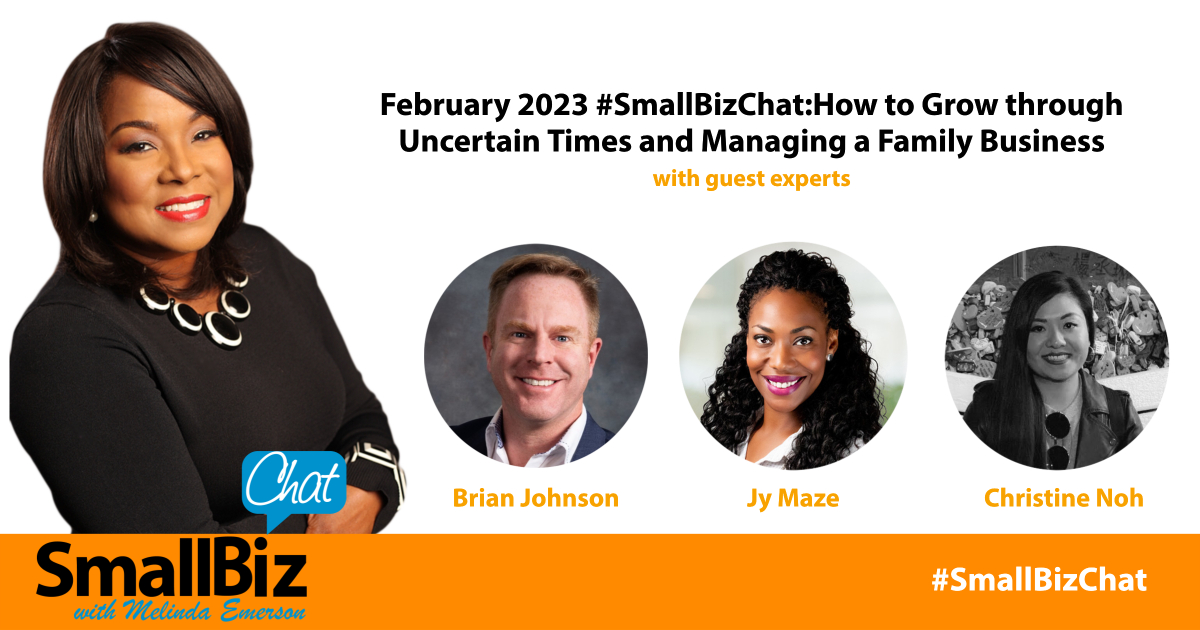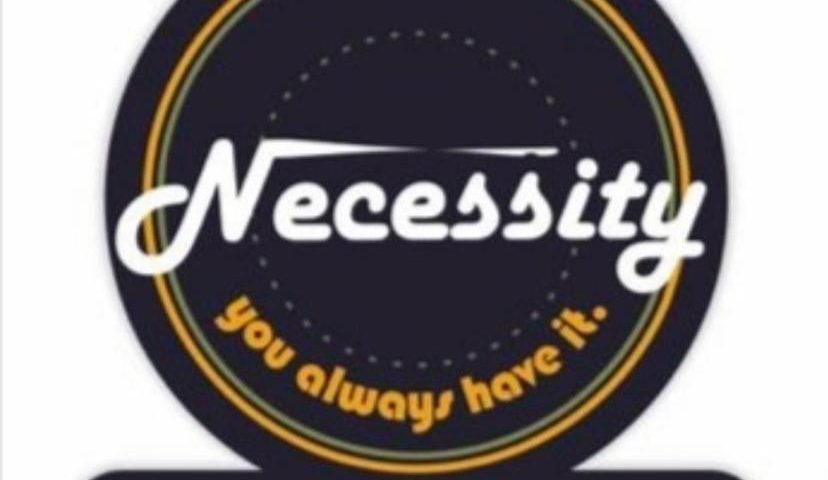 #Smallbizchat Podcast LIVE is a monthly video interview show where small business owners can get answers to their questions.
#Smallbizchat Podcast LIVE is a monthly video interview show where small business owners can get answers to their questions.
The focus of #Smallbizchat is to end small business failure by helping participants succeed as your own boss.
Please join us live every third Wednesday of the month from 8-9 pm ET Live on my SmallBizLady Facebook Page, YouTube Channel and LIVE on Twitter.
 Brian Johnson is the CEO of Main & Johnson, a Charlotte, North Carolina, based Business Consulting & Coaching company, aimed at seeing small to medium-sized businesses thrive, not just survive. Main & Johnson partners with business owners to bridge the gap between what success they have had and the success they seek. Brian and his team specialize in project-based consulting to provide both the assessment and strategic process as well as delivering through the execution phase. The organization has subject matter expert consultant’s adept at a wide-range of desirables and deliverables within organizations in areas of people, process and performance. For more information: www.mainandjohnson.com
Brian Johnson is the CEO of Main & Johnson, a Charlotte, North Carolina, based Business Consulting & Coaching company, aimed at seeing small to medium-sized businesses thrive, not just survive. Main & Johnson partners with business owners to bridge the gap between what success they have had and the success they seek. Brian and his team specialize in project-based consulting to provide both the assessment and strategic process as well as delivering through the execution phase. The organization has subject matter expert consultant’s adept at a wide-range of desirables and deliverables within organizations in areas of people, process and performance. For more information: www.mainandjohnson.com
SmallBizLady: When times are uncertain, how do you know what the next step is if you want to continue growth?
Brian Johnson: The first key to knowing what to do next is to know where you are and what is happening around you. We spend a good deal of our efforts assessing this with companies because the first basis for dealing with uncertainty is addressing the part you do control – where you are at. What is going on around you is more about what is happening in the market. It’s like being ten miles off the coast, out at sea. On a calm day, you check your coordinates and your compass and know where you are at. But because you see calm seas and visibility for miles, things don’t seem uncertain. However, you can be in the same position, 10 miles off the coast, and a storm comes, visibility is reduced, and waves batter you.
If you know where you are, you can choose to ensure or possibly change course. Imagine the same scenario, but you don’t know where you are at. You still may feel the same when it is calm because there is nothing threatening your position. However, if that storm comes and you aren’t exactly sure where you stand, you may turn harder into the storm through decisions that put you at further risk. When we work with organizations to uncover where they are truly at as a business relative to their market and competition, it helps them develop a clear view of the best decisions in front of them.

SmallBizLady: How should I adjust my strategy if the market I am in is becoming less certain?
Brian Johnson: There are several types of strategies you can use at any time. We like to look at four ways you can go about growing your business. The first is a market growth strategy. This is where your “pie” is expanding, so therefore, your “slice” should be expanding if you maintain the same share % in the marketplace. This strategy is predominantly about being present and available to capture growth as your market expands. Generally, this is seen a lot more in positive market conditions. So, for most of us, this has been a very successful strategy over the past 10 years.
The second strategy is Share Gain Strategy. This is more centered around not being concerned if your “pie” is growing, but rather how you can grow your slice by taking portions of your competition’s slice. So, in what ways are you going directly after your competition’s business.
A third strategy is Market Transformation Strategy. Here, you are trying to grow the size of the overall “pie” by attracting buyers to what your market offers. Even if they don’t buy from you but do buy from your competition (relative to what you compete on), then you have expanded the number of buyers in your market. You can always go fight your competition over them at a later time. An example would be hand dryers versus paper towels in bathrooms. The hand dryer companies may be on a mission to convert paper towel users to hand dryer users. Even if they choose to buy from someone else, they will likely be in the market for hand dryers from here on out.
And the final strategy you can use to increase your business would be an adjacency strategy. This would be moving to a different “pie” to create a small “slice” for you. Here, an example might be a bookkeeper that offers outsourced bookkeeping that also get QuickBooks certified to train companies who choose to insource bookkeeping. They may not get the revenue from their efforts to be the outsource option, but they can make some revenue off of companies who do not fit their original “pie”. Any of these strategies can work at any time, but more traditionally, companies tend to focus on Market Growth Strategies until that “pie” stops growing or slows down in its growth. Then they may shift to one of the other three strategies.
SmallBizLady: Do the stages or cycles a company is in change when because of an uncertain market?
Brian Thompson: The stage your company is in shouldn’t change specifically due to an uncertain market, but it could change the choices you make in that stage or affect the length of time you might have to remain in that stage. In the early stage of your business, you are checking boxes to allow you to be a viable business. This could be adequate funding, a business plan, a vision and mission, your EIN number, etc. This phase may be affected by an uncertain market as to the timing to enter it, but you aren’t actually out competing yet, so it hasn’t directly affected your business yet.
The Ascent phase is all about getting to a minimum revenue level to survive. In your business, this is keeping the focus on getting the revenue that supports your business. Or getting enough to pay all the bills your company has. It is more of a topline focus to get to the scale you need to be at in order to survive. In an uncertain market, this may make sledding a little tougher, but it shouldn’t change the need to remain focused on grabbing top-line growth.
At Cruising Altitude, it is about efficiency and effectiveness, profitability, and long-term success. This is where you focus on loyalty and customer retention, and usually it’s the longest stretch of the business journey. You are working to retain employees or enhance customer loyalty. You may adjust altitude or grow, but it isn’t based on survival at this point, it’s about navigating for the smoothest ride ahead. This area also would change due to an uncertain market beyond perhaps what adjustments are needed or how long you may be here before you could look at that Descent phase, or the exit. If the other phases are done correctly, you start a nice, slow, deliberate descent to your destination. This phase is about determining if you will exit the business and sell, allow employees to buy in/buy out, and hand the business down to a family member. Whatever the approach, uncertainty may not fundamentally change where you are in your business cycle, but it may impact the timing you choose to do it relative to the value you seek.
How to Manage a Family Business
 Christine Noh is the CEO of Nohble, a sneaker and streetwear retailer with locations in New York and New Jersey. Christine started her professional career in investment banking at JPMorgan Chase. She left investment banking to pursue her entrepreneurial passions. In 2013, she opened Nohble’s flagship location in Newark, NJ. In 2014, she moved Nohble’s offices to a 30,000 sq. foot warehouse to support e-commerce expansion. In 2020, she opened her newest boutique location in Manhattan. For more information: www.Nohble.com
Christine Noh is the CEO of Nohble, a sneaker and streetwear retailer with locations in New York and New Jersey. Christine started her professional career in investment banking at JPMorgan Chase. She left investment banking to pursue her entrepreneurial passions. In 2013, she opened Nohble’s flagship location in Newark, NJ. In 2014, she moved Nohble’s offices to a 30,000 sq. foot warehouse to support e-commerce expansion. In 2020, she opened her newest boutique location in Manhattan. For more information: www.Nohble.com
SmallBizLady: What has been your main pro and con of working in a family business?
Christine Noh: For me knowing that my family has my back 100% and vice versa is the biggest pro. I am not worried that they have ulterior motives because there is an underlying relationship based on trust. That trust has given me the freedom to try new things at Nohble in pursuit of growth. The biggest con is that conflict is inevitable, so when it does occur it’s like turning the volume all the way up because family dynamics are complicated.
SmallBizLady: What structures do you have in place to deal with conflicts?
Christine Noh: At Nohble, we try not to have any family meetings if emotions are high. When everyone is ready to regroup – the first question I ask is “What is your goal in this meeting?” Too often in families, things are left unsaid, especially in immigrant families. So, I overcompensate lol by being extremely explicit, intentional and honest in my communication. I am often accused of being too brutally honest in fact. But I feel strongly that if we don’t get everything out in the open, we cannot get to the root of the issue, and if we cannot get to the root of an issue, we cannot arrive at a solution. And while I hate conflict…I hate spinning my wheels more and the only way out is thru. And listening is underrated. Too often (and I am guilty of this too) I’m too focused on making my argument and I am not really HEARING and validating the other person’s perspective/pain point etc.

SmallBizLady: What is the biggest challenge facing family businesses?
Christine Noh: Succession is one of the biggest hurdles facing family businesses and 80% of family businesses do not survive into the second generation. It’s awkward but really important to have conversations about retirement, illness, and death within the family to adequately succession plan. I am obsessed with creating manuals – I want everything written down. That way, God forbid something happens, there is someone who can pick up the manual and keep the business functioning. Additionally, it’s very important to work on estate planning proactively with a professional. Moreover, to have an effective succession plan, everyone needs to know and agree on the exit strategy. All this applies to anyone running a business – partners, husband/wife, parent/child, etc.
How to Leverage Industry Experts
 Jy Maze is a speaker, author, and community advocate. She is the founder, CEO of Maze Freight Solutions, a third-party logistics services business based in Overland Park, Kansas. Maze Freight Solutions provides logistics services including one or more elements of commercial procurement, supply chain management, and fulfillment activities for all sizes and categories of enterprises. Jy wanting to change the lack of diversity in the logistics industry which led her to founding Maze Freight Solutions in 2017. For more information: https://mazefreightsolutions.com/
Jy Maze is a speaker, author, and community advocate. She is the founder, CEO of Maze Freight Solutions, a third-party logistics services business based in Overland Park, Kansas. Maze Freight Solutions provides logistics services including one or more elements of commercial procurement, supply chain management, and fulfillment activities for all sizes and categories of enterprises. Jy wanting to change the lack of diversity in the logistics industry which led her to founding Maze Freight Solutions in 2017. For more information: https://mazefreightsolutions.com/
SmallBizLady: Why should business owners align their enterprises with industry professionals?
Jy Maze: Industry professionals are experts who can provide profitable perspectives. Industry professionals deal with industry situations every day, all day and they maintain a wealth of information, updates, and insights. These insiders speak the industry language, too. As experts, they offer an informed perspective on trends, governmental rulings, potential downturns, labor situations, seasonal challenges and price fluctuations. By working with industry professionals, owners can remain “in the know” for more effective planning, competitive bidding, and consistent customer service at their own businesses.
SmallBizLady: Can’t entrepreneurs handle all of the industry dynamics themselves?
Jy Maze: Why, What and Who can take time to comprehend. Simply sitting through a seminar won’t provide an in depth understanding of an industry’s history and roadmap. It is important to know the specific nuances of why things are the way they are inside an industry and then build valuable relationships with the decision makers, key influencers and subcontractors. Most entrepreneurs simply don’t have the time to dedicate themselves to this level of comprehension. Rather than following the old “I can do it myself” philosophy, it could prove more efficient, effective and profitable for them to utilize industry professionals to help save time, deal with challenges, and reduce errors in judgments.

SmallBizLady: What are the best ways to locate industry experts?
Jy Maze: Use industry organizations to meet and greet all types of industry experts.
An optimum way to locate professionals is through industry organizations and associations. Study their membership rosters for names and websites. Shake hands and introduce yourself at industry conferences and events. Read industry magazines for feature stories and articles written by industry professionals. Ask a business associate exactly who they would recommend. Last but not least, don’t wait until you have to deal with a setback or a serious situation to find an industry professional. Before you make hasty decisions that don’t produce the outcome you would prefer, establish relationships with industry professionals now.
Did you find these interviews helpful? Please tell me how they helped and then share them.
Would you like to be a guest on #Smallbizchat Live?
If you are a small business owner, author, or subject matter expert, we’d love to have you appear as a guest on #Smallbizchat LIVE. Submit you’re a specific topic, name, headshot, Twitter/IG handle, mini bio, website, topic and 3 questions and answers in paragraph form to demonstrate your expertise. To submit your materials to be a guest on #Smallbizchat click here.





